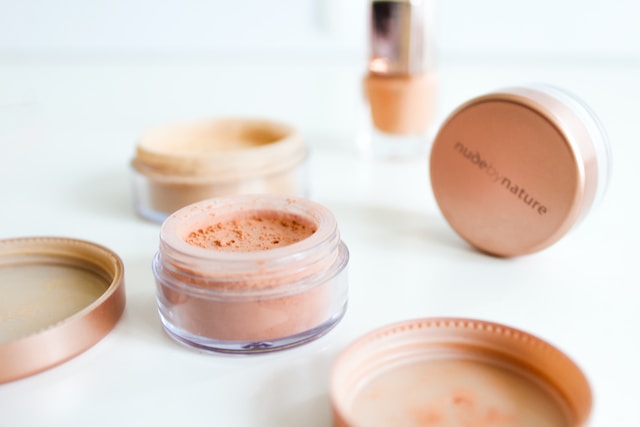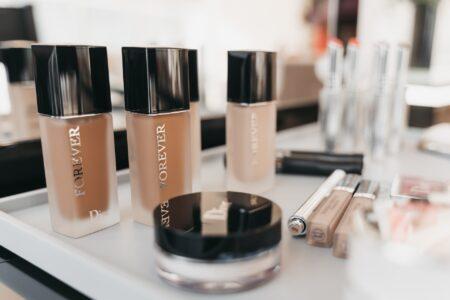Dermatologists understand the importance of choosing the right foundation, especially for those with dry skin. The selection of foundation is more than a cosmetic decision; it can significantly impact skin health and appearance. In this article, we delve into the various types of foundation and offer insights into the best foundation for dry skin.
Understanding the Spectrum of Foundation Types
- Liquid Foundation: Liquid foundation is a versatile choice that caters to various skin types. This option often contains hydrating components, such as hyaluronic acid or glycerin, which are essential for dry skin. The benefit of a liquid foundation lies in its buildable coverage and ability to retain moisture.
- Cream Foundation: Individuals with very dry skin often benefit from cream foundation’s thicker consistency and full coverage. Cream foundations deliver intense hydration, creating a smooth, radiant complexion.
- Powder Foundation: Though typically not the first choice for dry skin, hydrating powder foundations are available. These formulas offer a matte finish without excessive dryness.
- Mineral Foundation: Mineral foundations, often devoid of irritants, can be suitable for dry skin. They provide a lightweight, natural finish.
Having explored the foundation landscape, it is now time to delve into specific recommendations, including budget-friendly drugstore options.
Best drugstore foundation for dry skin
Dermatologists understand the need for quality skincare without breaking the bank. Fortunately, several drugstore foundations are tailored to individuals with dry skin. Here are some of our top recommendations for the best foundation for dry skin:
- L’Oréal Paris True Match Lumi Healthy Luminous Makeup: This dermatologist-approved liquid foundation boasts a radiant finish. It incorporates skin-nourishing ingredients like vitamin C and E, offering hydration for dry skin.
- Maybelline Fit Me Dewy + Smooth Foundation: Part of the popular Fit Me line, this hydrating foundation provides a dewy finish and includes SPF 18 for added sun protection.
- Neutrogena Hydro Boost Hydrating Tint: Neutrogena’s Hydro Boost range is renowned for its hydrating properties. This tinted moisturizer imparts sheer coverage while replenishing moisture to dry skin.
- CoverGirl Clean Fresh Skin Milk Foundation: For those seeking a lightweight, natural appearance, this vegan foundation is an ideal choice. Formulated with coconut milk and aloe extract, it ensures moisture for dry skin.
- Revlon ColorStay Makeup for Normal/Dry Skin: Available in various shades, this foundation offers long-lasting coverage. It is crafted to provide both hydration and a flawless finish.
These budget-friendly drugstore foundations cater to dry skin’s needs without compromising quality. They permit a flawless appearance while sustaining the skin’s health and integrity.
Considering Liquid Foundation for Dry Skin
Individuals with dry skin often question whether liquid foundation is an appropriate choice. The suitability of liquid foundation for dry skin depends on multiple factors, including personal preferences and specific product formulations. Dermatologists offer insights into the pros and cons:
The Advantages of Liquid Foundation for Dry Skin
- Hydration: Many liquid foundations feature hydrating components like hyaluronic acid, glycerin, or oils. These ingredients lock in moisture, mitigating dryness.
- Buildable Coverage: Liquid foundations are versatile, facilitating both sheer and full coverage. Users can layer the product as needed to accommodate different occasions.
- Radiant Finish: Liquid foundations often yield a radiant, dewy finish. This can enhance dry skin’s luminosity and overall appearance.
The Drawbacks of Liquid Foundation for Dry Skin
- Oxidation: Some liquid foundations are prone to oxidation, causing color changes over time. This issue can emphasize dry patches.
- Potential for Caking: Without proper application or if the formula is excessively heavy, liquid foundation can cake on dry areas, accentuating dryness.
- Longevity: Liquid foundations may require touch-ups to maintain their appearance throughout the day. Some formulations do not offer long-lasting coverage.
In essence, the efficacy of liquid foundation for dry skin hinges on the specific product and its formulation. To ensure a smooth, radiant finish without emphasizing dryness, opt for a foundation designed explicitly for dry skin and enriched with hydrating ingredients. Preparing the skin with a suitable skincare routine, encompassing moisturizing and exfoliation, can further enhance foundation application results.
Dermatologist-Endorsed Foundations for Dry Skin
In the pursuit of skin health and flawless makeup, dermatologists often recommend specific foundations renowned for their skin-friendly formulations. Here, we unveil the foundations that dermatologists favor for individuals with dry skin:
- La Roche-Posay Toleriane Teint Hydrating Water-Cream Foundation: This foundation caters to sensitive and dry skin. Its water-based formula nurtures a natural, comfortable finish without clogging pores or causing irritation.
- IT Cosmetics Your Skin But Better CC+ Cream: While technically a CC cream, this product offers impressive coverage and hydration. Infused with hyaluronic acid and peptides, it addresses dry skin’s needs while enhancing overall skin appearance.
- Clinique Even Better Makeup SPF 15: This allergy-tested foundation is compatible with sensitive skin. It combines hydration with the ability to even out skin tone, producing a radiant finish.
- BareMinerals Complexion Rescue Tinted Hydrating Gel Cream: A fusion of gel and cream, this product integrates hydration with mineral SPF for skin protection. It delivers buildable coverage and a dewy glow ideal for dry skin.
- Tarte Amazonian Clay Full Coverage Foundation: For those who prefer full coverage, Tarte’s Amazonian Clay Foundation fits the bill. It provides substantial coverage while remaining gentle on dry skin.
Dermatologists recommend these foundations to optimize skin health while delivering essential coverage and hydration. The selection should always align with individual skin concerns and needs. The choice of the best foundation for dry skin is personal.
Matte vs. Hydrating Foundation: The Ideal Choice for Dry Skin
The debate between matte and hydrating foundations arises frequently when addressing makeup options for dry skin. Each type presents its own merits, and the preference hinges on skin needs and desired finish.
Matte Foundation for Dry Skin
Matte foundations are lauded for their oil-absorbing properties, making them a go-to for individuals with oily or combination skin. However, can matte foundations benefit dry skin as well?
Pros of Matte Foundation:
- Longevity: Matte foundations often provide extended wear, making them suitable for all-day use.
- Oil Control: These foundations effectively manage excess shine, particularly in areas prone to oiliness.
Cons of Matte Foundation:
- Drying Potential: Matte foundations can sometimes exacerbate dryness, as they may not contain moisturizing elements.
- Accentuating Dry Patches: The matte finish may emphasize dry patches and texture irregularities on the skin.
Hydrating Foundation for Dry Skin
On the flip side, hydrating foundations are designed to address the unique needs of dry skin.
Pros of Hydrating Foundation:
- Moisture Retention: These foundations prioritize hydration, which is essential for dry skin. They often contain ingredients like hyaluronic acid or glycerin to lock in moisture.
- Radiant Finish: Hydrating foundations provide a luminous, dewy finish, enhancing the skin’s natural glow.
Cons of Hydrating Foundation:
- Less Oil Control: Individuals with oily or combination skin may find that hydrating foundations do not control excess oil effectively.
- Potential for Shorter Wear: Some hydrating foundations may require touch-ups throughout the day, as they may not offer long-lasting coverage.
In conclusion, the choice between matte and hydrating foundations for dry skin hinges on individual preferences and skin needs. For those with dry skin, hydrating foundations are often the superior choice as they prioritize moisture and create a radiant finish.
Addressing Dryness After Foundation Application
Dryness after applying foundation can be a frustrating experience. Dermatologists often encounter patients concerned about this issue. Let’s delve into the factors contributing to this problem and explore solutions to prevent it.
Potential Causes of Post-Foundation Dryness
- Inadequate Hydration: Dry skin may not be adequately moisturized before applying foundation. Without a well-hydrated base, the foundation can accentuate existing dryness.
- Wrong Foundation Choice: Using a foundation unsuitable for dry skin can exacerbate the issue. Matte or oil-absorbing foundations may not provide the necessary hydration.
- Excessive Powder Usage: Over-application of setting powders, especially those with dry ingredients, can absorb moisture, leaving the skin parched.
- Lack of Prep: Skipping essential skincare steps like moisturizing or exfoliating can lead to an uneven texture that the foundation may emphasize.
Preventing Post-Foundation Dryness
- Hydrate Your Skin: Begin with a well-hydrated base by applying a suitable moisturizer. Look for one containing hyaluronic acid, glycerin, or ceramides to lock in moisture.
- Choose the Right Foundation: Opt for a foundation designed for dry skin with hydrating ingredients. Liquid or cream foundations are often better choices.
- Limit Powder Usage: Use setting powder sparingly, focusing on areas prone to shine. Choose a translucent powder or one specifically formulated for dry skin.
- Prep Your Skin: Prioritize skincare. Regular exfoliation can remove dry, flaky skin, and the use of a hydrating primer can create a smooth canvas for foundation.
In conclusion, post-foundation dryness can be mitigated by proper skin care, choosing the right foundation, and using makeup products that prioritize hydration. By addressing these factors, individuals with dry skin can achieve a radiant, moisturized complexion even after foundation application.
In the pursuit of flawless skin, dermatologists emphasize the importance of understanding one’s unique skin needs and selecting products that align with those requirements. This comprehensive guide provides invaluable insights into the world of foundation, catering specifically to individuals with dry skin. It empowers individuals to make informed decisions about their makeup choices, ensuring both the health and beauty of their skin.







